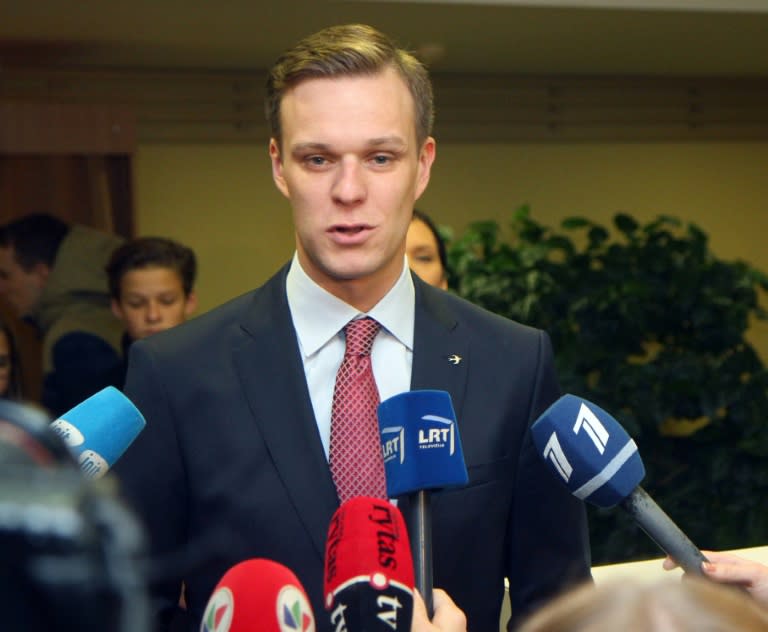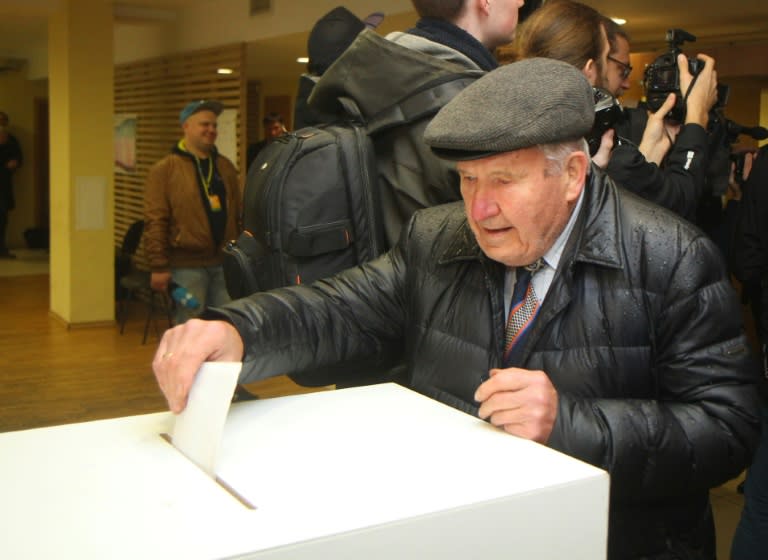Lithuania opposition eyes power in tight run-off election
Lithuania's left-wing government was fighting for survival Sunday in a run-off election clouded by an exodus of workers that has fuelled a demographic crisis in the Baltic eurozone state. Official results expected later on Sunday were forecast to hand victory to either the conservative Homeland Union or the centrist Lithuanian Peasants and Green Union party (LPGU). No exit polls were issued after the close of voting at 1700 GMT. Lithuania's election commission tallied turnout at 38 percent of the 2.5 million eligible voters. Both main opposition parties scored just over 21 percent of the vote in round one of the election on October 9, while Prime Minister Algirdas Butkevicius's Social Democrats trailed in third with just 14.42 percent. Three other small political parties entered parliament after the first round, signalling that complicated coalition talks lie ahead in the coming days. Tipped as the next prime minister, Homeland Union leader Gabrielius Landsbergis has presented himself as the face of change. The 34-year-old grandson of Lithuanian independence icon Vytautas Landsbergis has vowed to fight emigration by creating jobs, reforming education, boosting exports and foreign investment. Landsbergis has said he is keen to forge a coalition with the LPGU but has ruled out a deal with the Social Democrats. Wage growth and job creation have been key issues for candidates in the country of 2.9 million people, plagued by an exodus of workers seeking higher wages abroad. Since Lithuania joined the European Union in 2004, an estimated 370,000 people have left -- nearly half to Britain, where concern over immigration from eastern Europe was a key factor in June's shock referendum vote to leave the bloc. - 'I want change' - Landsbergis has won support among disillusioned voters like Vilnius businessman Linas Bagiusis. "I want change. We need new ideas and new energy, especially to curb emigration and stop all the young people from fleeing," he told AFP on Sunday outside a polling station in central Vilnius. Prime Minister Butkevicius has promised further increases to the minimum wage and public sector salaries. But analysts say a new labour law making it easier to hire and fire employees, coupled with allegations of political corruption, have alienated voters already bitter over low wages and the brain drain to western Europe. Lithuania's economy shrank by nearly 15 percent during the 2008-9 global financial crisis but quickly recovered and is forecast to expand by 2.5 percent this year. But Lithuania's average wage of just over 600 euros ($670) per month after tax remains one of the lowest in the EU, and inequality and poverty remain comparatively high. - Neck-and-neck - Analysts have tipped the farmer-backed LPGU -- led by popular former national police chief Saulius Skvernelis -- as kingmakers after the vote. Skvernelis, 46, has said his party was open to coalition talks with both the conservatives and the Social Democrats. His hardline on corruption and the party's promise to revamp the economy won over Galina Aleksejeva, a 50-year-old seamstress. "They'll introduce fresh economic policy," she told AFP after voting in Vilnius, adding that she wants to see the LPGU in coalition with Butkevicius' Social Democrats. With the Homeland Union and LPGU expected to stay neck-and-neck in round two, Vilnius University analyst Mazvydas Jastramskis said a stalemate could be just around the corner. "It won't be good if both parties win equal voter support. Both will want to spearhead talks" to lead the next government, he told AFP. But he added that non-aligned President Dalia Grybauskaite could "invite certain party leaders she would like to see in the coalition to the negotiating table." Grybauskaite has criticised Butkevicius while making it known she favours "changes". Russia's deployment earlier this month of nuclear-capable Iskander missiles to its Kaliningrad exclave two weeks ago rattled nerves in Lithuania which shares a border with the Kremlin-controlled territory. But reassurance provided by NATO's beefed up regional presence -- a move that all major parties approve -- means that voters are more worried about their wallets than security.





